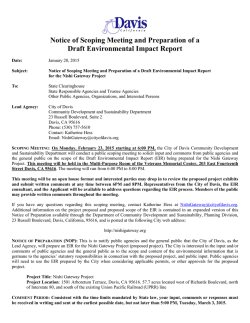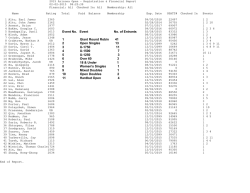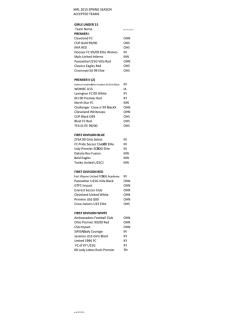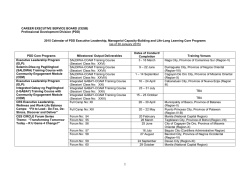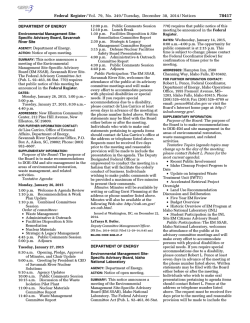
120-Day Report - Premier - Government of Newfoundland and
120-Day Report Premier Paul Davis Government of Newfoundland and Labrador January 30, 2015 The Honourable Paul Davis, Premier of Newfoundland and Labrador, with His Honour Frank Fagan, Lieutenant Governor of Newfoundland and Labrador, at the Premier’s swearing in. “Look to your government as a willing partner with a winning strategy for growth, and I pledge that we will respond to you in ways that will make the most of the opportunities that are sitting right at our doorstep. ...Let’s get on with the next phase and start to build the future upon that foundation that now exists. These times ahead are simply going to be electrifying.” - Paul Davis, September 26, 2014 On September 26, 2014, the Honourable Paul Davis was sworn in as the 12th Premier of Newfoundland and Labrador. In his first speech as Premier, Paul Davis promised to lead by listening, to work by partnering, to plan strategically for long-term results, and to spearhead real changes to build on the rock-solid social and economic foundation that has been established in Newfoundland and Labrador over the past decade. This report highlights key actions taken by the Government of Newfoundland and Labrador during Premier Davis’ first 120 days. Many of the initiatives Premier Davis has overseen during this period build upon the work for which the government received its mandate from Newfoundlanders and Labradorians in October 2011. When he assumed the role of Premier, the government was just 35 months into this 48-month mandate. Of the more than 500 commitments made in 2011, approximately 77 per cent are complete or substantially complete. The remaining commitments are in progress and the important work of fulfilling this mandate continues to advance toward completion. The actions of the past 120 days also follow through on the commitments of the 2014 Speech from the Throne. Of the 55 commitments contained in the Throne Speech, approximately 80 per cent are complete or substantially complete, while the remaining commitments are in progress. The first 120 days also featured brand new measures that reflect the commitments Premier Davis brought to his new role as leader of the Provincial Government. There were four specific commitments Premier Davis promised to act upon within his first 120 days in office in the areas of health care, youth engagement, public safety and reform of the legislature. 120-Day Report | Premier Paul Davis - Government of Newfoundland and Labrador 1 Executive Summary In the past 120 days, the Government of Newfoundland and Labrador under Premier Paul Davis has been busy listening, planning and acting decisively to deliver better government and build an even stronger province for the people. Reorganization of government departments: • Justice and Public Safety – The new department leads initiatives to address crime and safety in our communities, including the creation of a Premier’s Advisory Council on Crime. The new department augments the former Justice Department with the addition of Fire and Emergency Services-Newfoundland and Labrador. Premier Paul Davis listens to a reporter’s question at the closing news conference of the Council of Atlantic Premiers meetings. • Education and Early Childhood Development – The best education systems integrate early learning activities with the formal education system. The new department is responsible for the continuum of learning from infancy through high school. It brings together the teams that lead initiatives in early childhood education, the introduction of full-day kindergarten and other advances throughout the primary, elementary and secondary systems. It augments the former Education Department with early childhood development, previously housed in the Department of Child, Youth and Family Services. In addition to bringing together units with similar educational responsibilities, it enables CYFS to enhance its focus on the important child protection mandate. • Seniors, Wellness and Social Development – The most progressive societies are healthy ones that honour, listen to, lean on and include their elders in building stronger, more dynamic communities. This new department was established, in part, to reflect a changing reality in Newfoundland and Labrador - an aging demographic – and all the challenges and opportunities that brings. The move also realigns divisions and offices within government to focus more specifically on health promotion and the overall wellness of the entire population, regardless of age. On seniors’ issues specifically, the mandate crosses departments and government agencies – from health care to housing. • Business, Tourism, Culture and Rural Development – An integrated approach is the focus of the new department, taking advantage of natural synergies. The new department leads the effort to partner with those who have expertise in the arts, culture, tourism and rural innovation. Effective business development serves to diversify the economy in general and rural economies in particular. Rural economic diversification has partly been fueled by tourism development, which has been one of the province’s major success stories over the past decade creating hundreds of business opportunities and thousands of jobs. The preservation, celebration and presentation of Newfoundland and Labrador’s unique cultures are valued and valuable in their own right and must be supported. Concurrently, they remain a central focus of the province’s overall tourism development strategy. 2 The Premier has advanced the four specific initiatives he promised to launch within his first 120 days as Premier. 1. 2. 3. 4. Premier’s Summit on Health Care Youth Advisory Committee Advisory Council on Crime and Community Safety Reform of the House of Assembly, including •Reducing the number of MHAs •Changing the MHA pension plan •Reforming the day-to-day operations of the legislature to engage MHAs more effectively CETA: The Premier leads the campaign to demand that the Federal Government honour a deal it made with this province related to the trade agreement between Canada and the European Union (EU). To advance CETA negotiations, the Federal Government came to the province asking for the elimination of a long-standing provincial public policy on minimum fish processing requirements (MPRs – require whole fish to be at least semi-processed in Newfoundland and Labrador before export). The province agreed and in exchange made a deal with Ottawa to create a multi-million dollar fishery renewal fund that would support research, marketing, infrastructure and other renewal throughout the province’s fishing industry. The deal created a $400-million fishery renewal fund, with the Federal Government contributing $280 million if the Provincial Government contributed the remaining $120 million. The Federal Government is now attempting to impose conditions that will make it impossible for the province to access the fund. While the province remains committed to freer trade in principle, it is steadfast in demanding that the Federal Government honour its agreement. Facing the global challenge of plunging oil revenues, the Premier has demonstrated strong fiscal leadership. He is leading the work to develop the next provincial budget and long-term fiscal plan while conscious of the need to make responsible choices that will not harm the province’s economy. “In the pages that follow, you will find summaries of numerous initiatives that, as your government, we have commenced, advanced, amended or considered during the past four months. In the months to come, we will announce plans for 2015 and beyond in a new Speech from the Throne and Budget. “Your government is listening to you, and willing to adapt, not only to changing circumstances, but also to the input you provide. So let your voice be heard as we join forces to build on the enormous progress we have made in the past 10 years. I welcome your input, guidance and suggestions and hope you continue to reach out to me as I commit to reach out to you. Together we will build a great future for Newfoundland and Labrador.” Premier Paul Davis 120-Day Report | Premier Paul Davis - Government of Newfoundland and Labrador 3 Premier Davis addresses attendees at the Premier’s Summit on Health Care. Premier’s Summit on Health Care Entering office as Premier in September 2014, Premier Davis promised: “Within my first 120 days I will convene a forum on our provincial health system. A major focus of the forum should be on primary health care – the day-to-day care needed to protect, maintain and restore our health. Primary health care includes physicians, nurses, pharmacists, social workers, occupational therapists, physiotherapists, home-care workers and others. It is a focus on the first point of contact with the health care system and the prevention of disease. Key issues to be discussed will include: Mental Health & Addictions; Chronic Disease Management; Dementia Care; Healthy Living/Wellness and our Aging Population.” On November 13, 2014, Premier Davis announced that the Premier’s Summit on Health Care would be held in St. John’s in January 2015. Health and Community Services Minister Steve Kent led the consultations leading up to the summit. In addition to online consultations, Minister Kent held public forums in Baie Verte, Burin, Channel-Port aux Basques, Clarenville, Clarke’s Beach, Corner Brook, Gander, Grand Falls-Windsor, Happy Valley-Goose Bay, Kippens, Labrador City/Wabush, Mount Pearl and St. Anthony. In January, the government published a “What We Heard” document consolidating the feedback received. Overarching common themes included: • Coordination and continuity of care • Awareness of services • Wait times and hours of access 4 Delegates engaged in round table discussions during the Premier’s Summit on Health Care in January 2015. • • • • • • • Prevention and promotion Compensation models Access to allied health professionals Proximity to services Community services and supports Expanded access to nurse practitioners Mental health and addictions On January 14, 2015, over 300 health care professionals, stakeholder groups and residents gathered in St. John’s for the Premier’s Summit on Health Care. In his opening address to the participants, Premier Davis said: “Improving and maximizing our access to the day-today health care services that we all need is essential to a sustainable, efficient and responsive health care system. Through today’s summit, we are bringing together the key players in this equation like never before, and through a review of what we heard during our regional health forums and a series of interactive group discussions, we will begin to shape a framework for the future of primary health care in this province. 120-Day Report | Premier Paul Davis - Government of Newfoundland and Labrador 5 “The Premier’s Health Summit is the foundation for the next steps the government will take to make meaningful reforms to the province’s health care system for the benefit of Newfoundlanders and Labradorians. The system is far better than it was a decade ago, but now we move forward through consultation and partnership to put tangible solutions into action to achieve measurable results. That work begins now.” Reporting on the summit in the House of Assembly on January 19, Minister Kent said: “The Premier’s Summit has allowed us to identify a number of key areas of consensus on which we must place greater emphasis going forward. These areas include the need for interdisciplinary primary health care teams in our communities, shared electronic health records, improved access to health care services and supports, improved collaboration and coordination and a renewed focus on health promotion and disease prevention. “During the day we also saw a renewed focus on the theme of taking an ‘upstream’ approach to systemic challenges within our health care system. Integrating this approach, which has been part of the work of the Provincial Government for a number of years, puts a focus on the underlying root cause of any problem – such as the prevalence of type two diabetes or obesity, rather than treating the issue on the surface, over and over again. “Another key theme considered was the effects of the social determinants of health which include where people are born, grow, live, work and age. Applying a ‘Health in All Policies’ lens across government is a direction we will certainly consider as we move forward. Premier Davis and Minister Kent take part in round table discussions at the Premier’s Summit on Health Care. “As another key outcome of the summit, we announced the expansion of our Primary Health Care Advisory Committee through the addition of representation from the general public. Those interested in being considered for this opportunity are asked to contact the department for more information. “The Premier’s Summit on Health Care provided an opportunity for all participants to make their views known and to build strong and lasting partnerships between government, stakeholders and residents. As we move forward in the development of a primary health care framework, we will continue to strive to create real and lasting change for the benefit of all residents in Newfoundland and Labrador.” Key links: www.health.gov.nl.ca/summit/ www.health.gov.nl.ca/summit/What_We_Heard.pdf www.health.gov.nl.ca/summit/Participant_Workbook-Premiers_Summit_On_Healthcare.pdf 6 Premier’s Youth Advisory Committee Entering office as Premier in September 2014, Premier Davis promised that, within the first 120 days of his administration, the government would appoint a Premier’s Youth Advisory Committee. “We’ve got to make sure we maximize our opportunities with social media and current technologies,” said Premier Davis. “They’re ever changing, and they’re really difficult for many walks of life to keep up with these changes. The younger you are, the easier it is to keep up with the changes and to keep up to speed, but we’ve got to do that too as a government. I’ve talked about my first 120 days [in office] creating a Premier’s youth advisory [council]. We did some work a while back to increase the level of interaction between youth and municipal government, but we never really tapped into that as a Provincial Government. We have a lot of great things that happen with youth parliaments and those types of things, but also I think there’s great value in an advisory [council]. So we have youth with different backgrounds, different areas of interest, who we can have available to have more meaningful interactions with.” In December 2014, Premier Davis followed through on this commitment by announcing the creation of the Newfoundland and Labrador Youth Advisory Committee that will provide advice to the Provincial Government broadly on issues important to youth, including input into developing government policies, programs and services with specific relevance to youth. A committee of 23 members between the ages of 16 and 29 has been selected. Members were chosen from all areas of the province with consideration to gender, rural representation and Aboriginal status. Members serve a term from one to three years and will attend one meeting annually in person, while other meetings will be held via teleconference or video conference. The committee members will help shape enterprising and innovative communities and continue to build the province as a great place to live, to work, and to grow. They will actively participate in meaningful discussions, keep current on youth issues and council-related work, and share their valuable input and ideas with government. 120-Day Report | Premier Paul Davis - Government of Newfoundland and Labrador 7 Advisory Council on Crime Entering office as Premier in September 2014, Premier Davis promised to make justice and public safety key pillars of his administration. “In my first 120 days I would establish an Advisory Council on Crime and Community Safety with a mandate to examine crime prevention and control strategies in other jurisdictions and to propose new approaches or directions that will better serve the needs of victims and offenders and will promote safety and security throughout our province,” said Premier Davis. Premier Davis (centre back) joins Minister Cornect (back left), Minister Manning (second from the right) and representatives of the MADD Red Ribbon Campaign. Acting on this commitment, Premier Davis announced on January 23, 2015, the appointments to the Premier’s Advisory Council on Crime and Community Safety. The Advisory Council on Crime and Community Safety has representatives with a wide range of experiences from policing; academia; and the legal, Aboriginal, and mental health and addictions communities. The Council will be chaired by Anne Morris, a retired professor from the Sociology Department of Memorial University. Other members include: • Mary Pia Benuen, Director for Primary Health Services for the Sheshatshiu Innu First Nation; • Ron Fitzpatrick, Executive Director of Metro Community Chaplaincy (Turnings); • Lynn Moore, Partner in the law firm of Morris Martin Moore, who represents survivors of sexual abuse; • Cindy Murphy, Executive Director of the John Howard Society of Newfoundland and Labrador Inc.; • Sheldon Pollett, Executive Director of Choices for Youth; • Chief Bill Janes (Ex Officio Member), Chief of Police, Royal Newfoundland Constabulary; and • Assistant Commissioner Tracy Hardy (Ex Officio Member), RCMP Commanding Officer B Division, Newfoundland and Labrador The Council is tasked to examine all aspects of crime in Newfoundland and Labrador and recommend new strategies to prevent and reduce criminal activity and improve safety in the province. Using information gathered through consultation with partners, the general public and recognized experts, as well as through the study of relevant literature and the assessment of innovative practices already used in other jurisdictions, the Advisory Council on Crime and Community Safety will propose recommendations to Premier Davis that are designed to make Newfoundland and Labrador safer. “Every crime that occurs in our province is an affront to public safety for individuals and communities,” said Premier Davis. “We are all affected and we must all have an opportunity to contribute to finding solutions. In addressing the issues surrounding crime in our province, it is vital that we engage community stakeholder groups and those who have specialized knowledge. I thank the individuals who have offered to join the Advisory Council on Crime and Community Safety, and I look forward to receiving recommendations on how we can improve safety and security for all.” 8 House of Assembly Reform Entering office as Premier in September 2014, Premier Davis committed to initiating reforms to the way the House of Assembly is structured and operates. Reform will be immediately undertaken in three specific areas: 1. Reduction in MHAs On January 15, 2015, Premier Davis announced a key measure to reform the legislature by reducing the number of seats before the next general election. A review was to have been undertaken in 2016, but by moving it forward one year, in advance of a general election, considerable budgetary savings can be realized. On January 23, the House of Assembly voted to amend the Electoral Boundaries Act and redraw the provincial map into 40 electoral districts, with four guaranteed for Labrador. This initiative follows a process that has been in place since the early 1970s and commences with the Chief Justice appointing a commission chair (usually a judge). The Speaker of the House of Assembly then appoints four members to the commission (two nominees from the government and one from each of the other two parties). The commission reviews population numbers for communities and defines new boundaries to arrange communities in new districts. This process involves public consultation. The commission will conclude this work in 130 days or less. 2. Reform of MHA pensions Premier Davis has written to the Speaker of the House to convene a meeting of the Management Commission and, as per the House of Assembly Accountability, Integrity and Administration Act, to request that it appoint a Members’ Compensations Review Committee to review the MHA pension plan. 3. Review of committee structures and role of individual MHAs Premier Davis has asked the Speaker to convene a meeting of the Standing Orders Committee of the House of Assembly to complete an analysis of all standing orders with a view to modernizing procedures and make House of Assembly proceedings more efficient and provide for greater involvement of all MHAs in the legislative process. 120-Day Report | Premier Paul Davis - Government of Newfoundland and Labrador 9 Fall 2014 Legislative Agenda The fall sitting of the House of Assembly was in session November 17- December 16, 2014. Fifteen pieces of legislation were introduced, debated and passed during that period. Some of the legislation under consideration included the following: Pensions Funding Act and Public Service Pensions Act, 1991, were amended to reflect the Public Service Pension Plan Reform Agreement executed on September 2, 2014. Electoral Boundaries Act was amended in January 2015 to require the Electoral Boundaries Commission to report upon the delimitation of the province into districts in 2015; reduce the number of one-member districts in the province; and make consequential amendments for the purpose of a commission report in 2015. Missing Persons Act was passed to allow members of the Royal Newfoundland Constabulary and the Royal Canadian Mounted Police to access records about a missing person that may assist them in locating the missing person; and to enter a dwelling or other premises to search for a missing minor or vulnerable person. This legislation represents a significant advance in public safety. Premier Davis said, “Given the nature of missing person’s cases, timely access to information is crucial in safely locating an individual who could be at risk of harm even if there is no evidence of criminal wrongdoing. In these cases, the Missing Persons Act will allow police to quickly access critical data that could be invaluable in conducting an immediate, thorough and effective investigation into the status of a missing person. This will help in the effort of ensuring the safety and security of the individual involved and it certainly fits within this government’s mandate of making communities safer.” Highway Traffic Act was amended to require all persons riding a bicycle to wear a helmet. This amendment provides a provincial standard for regulations regarding bicycle helmets. The province will monitor the impact of the new measure on head injury rates and cycling prevalence. Revenue Administration Act was amended to establish a procedure for the issuance of electronic clearance certificates. “As a government, we are increasing the way citizens can access information, while at the same time upholding the protection of personal and private information. With the development and implementation of an online, restricted access, Tax Clearance Certificate request system, we will continue to ensure that people’s personal and private information is protected and secure,” said Finance Minister Ross Wiseman. Chartered Professional Accountants and Public Accountants Act, a new piece of legislation, was passed to merge the professions of Chartered Accountant, Certified Management Accountant and Certified General Accountant into the profession of Chartered Professional Accountant. The Bill retains the public accountant designation, and provides for the governance, membership and discipline of chartered professional accountants and public accountants. The legislation creates a new organization known as the Chartered Professional Accountants of Newfoundland and Labrador (CPANL). “One of the benefits of the new designation is a new education program which meets or exceeds existing programs and also offers advanced and increased training opportunities. Accountants of different designations typically performed different types of work in the past, but today that is no longer the case,” said Service NL Minister Tony Cornect. 10 Child Care Act was passed, replacing the former act. There were six key differences between the new Bill and the legislation it replaced: • The definitions of a “child care service” and a “child care provider” have been clarified and strengthened to outline specific exemptions to each definition; • The capacity limit on a regulated child care license has been removed which allows licensees to determine the scope of their service but does not impact quality of service for children; • An appeals process for a licensing decision has been defined; • The Minister, rather than the Lieutenant Governor in Council, will now appoint the provincial director of child care. The normal public service competition process will apply to that position; • Regional managers will not be appointed as inspectors, providing transparency in the inspection process; and • A statutory review will be required every five years, including a public consultation. Registered Nurses Act, 2008, was amended to add regulation-making authority respecting quality assurance; to add quality assurance provisions to enhance public protection and accountability; and to allow the complaints authorization committee to refer an allegation to the quality assurance committee. The amendment will require the establishment of a Quality Assurance Committee whose responsibility is to carry out quality assurance reviews. While there are measures in place that currently allow for a review of a registered nurse’s practice, the addition of these provisions to the act will authorize the committee to exercise powers to require a registered nurse to: • Undergo an examination, evaluation, assessment or review of his or her professional practice or capacity or fitness to practice; • Obtain counselling; • Complete a course of studies or an educational/training program; • Restrict his or her nursing practice; and • Obtain supervised clinical experience. Social Workers Act was amended to add quality assurance provisions to enhance public protection and accountability; to allow the complaints authorization committee to refer an allegation to the Quality Assurance Committee; to require a social worker who has knowledge of conduct deserving of sanction of another social worker to report that knowledge to the registrar; and to require a person who terminates the employment of or dissolves a partnership with a social worker based on knowledge of conduct deserving of sanction of that social worker to report that knowledge to the registrar. “These quality assurance measures will provide further checks and balances within the profession to ensure that social workers are delivering the best services and care to the people who rely and depend on their expertise,” said Health and Community Services Minister Steve Kent. 120-Day Report | Premier Paul Davis - Government of Newfoundland and Labrador 11 120-Day Report Premier Paul Davis Government of Newfoundland and Labrador
© Copyright 2026
